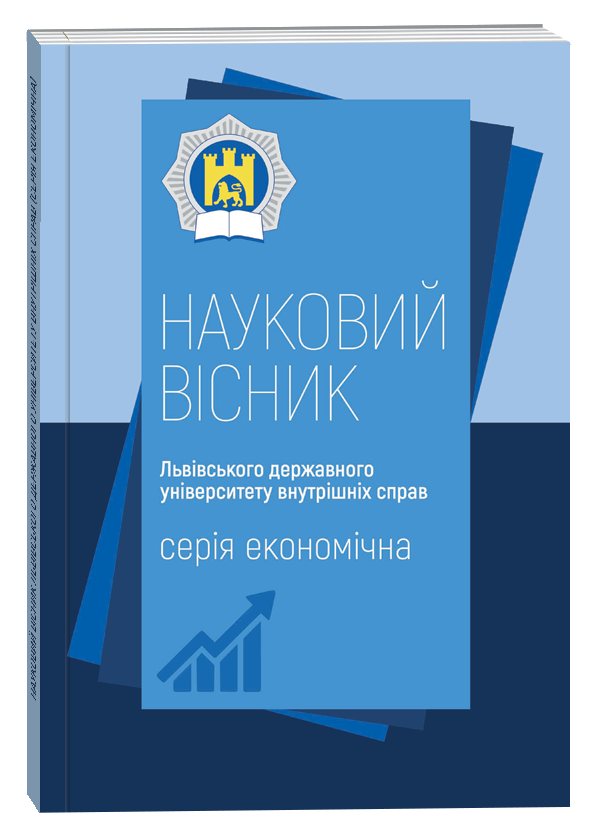АНАЛІЗ КЕЙСІВ ІНОЗЕМНИХ FINTECH-КОМПАНІЙ ТА ОБҐРУНТУВАННЯ ЇХ ЗАСТОСУВАННЯ В УКРАЇНІ
DOI:
https://doi.org/10.32782/2311-844X/2023-1-16Ключові слова:
FinTech компанія, сегмент, чинники впливу, кейс, фінансові установи, банкиАнотація
У статті визначено стратегічне значення розвитку FinTech в Україні на основі кейси іноземних FinTech-компаній. Досліджено елементи фінансово-кредитних установ, які забезпечують належні умови функціонування даного ринку та встановлено відмінні риси вітчизняного ринку FinTech. Уточнено визначення сутності поняття «FinTech» як інновації заснованої на використанні інформаційних технологій радикальної інновації у фінансовій сфері, впровадження якої призводить до кардинальних змін у фінансових продуктах, технологіях (процесах), бізнес-моделях фінансових посередників, а також до появи нових суб’єктів ринку – FinTech-компаній. Розглянуто наукові основи банківського бізнесу (зокрема міжнародного); охарактеризовано трансформації бізнес-моделей банківського бізнесу під впливом фінансових технологій. Встановлено, що основними рушійними силами розвитку FinTech є наявність мобільного Інтернету та смартфонів, зниження довіри населення до банків та незадоволення певними видами банківських послуг. Представлено характеристику основних трендів FinTech, таких як послуги через соціальні мережі, альтернативні платежі, маркетплейси, штучний інтелект, цифрова ідентифікація і біометрія, відкриті інтерфейси програмування, необанки, блокчейн. Подано структуру ринку FinTech за типами компаній. Проведено аналіз видів іноземних FinTech-компаній. Зазначено, що FinTech-компанії стрімко витісняють банки, а також надано їх характеристику. Виділено особливості розвитку FinTech-сегменту США. Визначено чинники, що впливають на розвиток FinTech-сегментів, та проаналізовано їх рейтинг у деяких країнах світу. Виділено найбільш стабільні сегменти FinTech у світі, серед яких слід назвати грошові перекази, заощадження та інвестиції, фінансове планування, страхування, позики. Досліджено ступінь впровадження FinTech у зарубіжних країнах та в Україні. Виділено напрями інвестування у сектор FinTech. Досліджено світові та вітчизняні тенденції розвитку FinTech-сегментів. При цьому, слід зазначити, що успіх управління ризиками фінансової стабільності на макрорівні безпосередньо залежить від швидкості впровадження національними регуляторами новітніх фінансових технологій.
Посилання
Ломачинська І. А., Мумладзе А. О. Вплив технологічних змін на трансформацію фінансових систем. Право, економіка та управління: генезис, сучасний стан та перспективи розвитку : матеріали міжнародної науково-практичної конференції. Одеса : Фенікс, 2018. С. 49–54.
БЛОГ: Світова карта FinTech: США. URL: https://evris.law/uk/stattja-svitova-karta-fintech-ssha (дата звернення: 14.10.2023).
Фінтех в Україні: тенденції, огляд ринку та каталог. URL: http://data.unit.city/fintech/fgt34ko67mok/fintech_in_Ukraine_2018_ua.pdf (дата звернення: 16.10.2023).
Cosmulese C. G., Grosu V., Hlaciuc E. & Zhavoronok A. The Influences of the Digital Revolution on the Educational System of the EU Countries. Marketing and Management of Innovations. 2019. № 3. Р. 242–254.
Chernadchuk V., Sukhonos V. & Shkolnyk I. The notion and content of financial system in the context of financial law of Ukraine. Problems and Perspectives in Management. 2017. № 15(2-1). Р. 234–245.
Chmutova I., Vovk V. & Bezrodna O. Analytical tools to implement integrated bank financial management technologies. Economic Annals-XXI. 2017. № 163(1-2(1)). Р. 95–99.
Kholiavko N., Djakona A., Dubyna M., Zhavoronok A. & Lavrov R. The higher education adaptability to the digital economy. Bulletin of the National Academy of sciences of the Republic of Kazakhstan. 2020. Vol. 4. № 386. P. 294–306.
Laktionova A. & Zhytar M. (2013) Institutional flexibility of decision making as a basis for a bank’s investment strategy selection. Economic Annals-XXI. 2013. № 5-6(1). Р. 49–52.
Azarenkova G., Shkodina I., Samorodov B., Babenko M. & Onishchenko I. The influence of financial technologies on the global financial system stability. Investment Management and Financial Innovations. 2018. № 15(4). Р. 229–238.
Fernandez-Vazquez S., Rosillo R., Fuente D. & Priore P. Blockchain in FinTech: A Mapping Study. Sustainability. 2019. № 1(22). Р. 63–66.
Abramova A., Beschastnyy V., Zhavoronok A., Fedyshyn M., Lavrov R., Dluhopolskyi O. & Kozlovskyi S. Financial technologies development prospects in the countries of Eastern Europe and Ukraine. International Journal of Management (IJM). 2020. № 11(7). P. 384–398.
Shkarlet S., Dubyna M., Vovk V. & Noga M. Financial service markets of Eastern Europe: a compositional model. Economic Annals-XXI. 2019. № 176(3-4). Р. 26–37.
Fedyshyn M. F., Marich M. G. & Abramova A. S. The influence of credit factors on the development of the real economic sector in the conditions of economic. Financial and credit activity: problems of theory and practice. 2018. № 2(25). Р. 366–374.
Ivashchenko A., Britchenko I., Dyba M., Polishchuk Ye., Sybirianska Yu. & Vasylyshen Yu. Fintech platforms in SME’s financing: EU experience and ways of their application in Ukraine. Investment Management and Financial Innovations. 2018. № 15(3). Р. 83–96.
Lomachynska I. A. & Mumladze A. O. (2018) Vplyv tekhnolohichnykh zmin na transformatsiyu finansovykh system. [Influence of technological changes on the transformation of financial systems]. Pravo, ekonomika ta upravlinnya: henezys, suchasnyy stan ta perspektyvy rozvytku: materialy mizhnarodnoyi naukovo-praktychnoyi konferentsiyi. Odesa: Phoenix, pp. 49–54.
BLOH: Svitova karta FinTech: SSHA [BLOG: World map of FinTech: USA] Available at: https://evris.law/uk/stattja-svitova-karta-fintech-ssha (accessed October 14, 2023).
Fintekh v Ukrayini: tendentsiyi, ohlyad rynku ta kataloh [Fintech in Ukraine: trends, market overview and catalog] Available at: http://data.unit.city/fintech/fgt34ko67mok/fintech_in_Ukraine_2018_ua.pdf (accessed October 16, 2023).
Cosmulese C. G., Grosu V., Hlaciuc E. & Zhavoronok A. (2019) The Influences of the Digital Revolution on the Educational System of the EU Countries. Marketing and Management of Innovations, no. 3, pp. 242–254.
Chernadchuk V., Sukhonos V. & Shkolnyk I. (2017) The notion and content of financial system in the context of financial law of Ukraine. Problems and Perspectives in Management, no. 15(2-1), pp. 234-245.
Chmutova I., Vovk V. & Bezrodna O. (2017) Analytical tools to implement integrated bank financial management technologies. Economic Annals-XXI, no. 163(1-2(1)), pp. 95–99.
Kholiavko N., Djakona A., Dubyna M., Zhavoronok A. & Lavrov R. (2020) The higher education adaptability to the digital economy. Bulletin of the National Academy of sciences of the Republic of Kazakhstan, vol. 4, no. 386, pp. 294–306.
Laktionova A. & Zhytar M. (2013) Institutional flexibility of decision making as a basis for a bank’s investment strategy selection. Economic Annals-XXI, no. 5-6(1), pp. 49–52.
Azarenkova G., Shkodina I., Samorodov B., Babenko M. & Onishchenko I. (2018) The influence of financial technologies on the global financial system stability. Investment Management and Financial Innovations, no. 15(4), pp. 229–238.
Fernandez-Vazquez S., Rosillo R., Fuente D. & Priore P. (2019) Blockchain in FinTech: A Mapping Study. Sustainability, no. 1(22), pp. 63–66.
Abramova A., Beschastnyy V., Zhavoronok A., Fedyshyn M., Lavrov R., Dluhopolskyi O. & Kozlovskyi S. (2020) Financial technologies development prospects in the countries of Eastern Europe and Ukraine. International Journal of Management (IJM), no. 11(7), pp. 384-398.
Shkarlet S., Dubyna M., Vovk V. & Noga M. (2019) Financial service markets of Eastern Europe: a compositional model. Economic Annals-XXI, no. 176(3-4), pp. 26–37.
Fedyshyn M. F., Marich M. G. & Abramova A. S. (2018) The influence of credit factors on the development of the real economic sector in the conditions of economic. Financial and credit activity: problems of theory and practice, no. 2(25), pp. 366–374.
Ivashchenko A., Britchenko I., Dyba M., Polishchuk Ye., Sybirianska Yu. & Vasylyshen Yu. (2018) Fintech platforms in SME’s financing: EU experience and ways of their application in Ukraine. Investment Management and Financial Innovations, no. 15(3), pp. 83–96.





